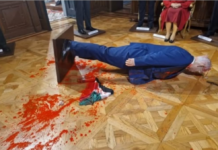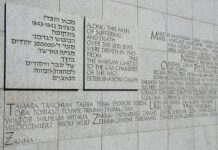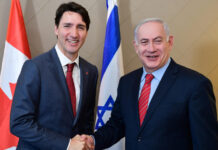Blame it all on John Foster Dulles.
The origins of an entity that has long been considered the focal point of organizational advocacy for Israel dates back to 1956, when President Dwight Eisenhower’s secretary of state was tired of being besieged by a variety of different Jewish groups. The Eisenhower administration was far from sympathetic to a Jewish state still struggling to establish itself and came down hard on the government led by Prime Minister David Ben-Gurion that year because of its opposition to the Sinai Campaign it undertook with Britain and France against the Egyptian regime of Gamal Abdel Nasser.
Various pro-Israel organizations worked in vain to persuade Dulles to relent from his pressure on Israel to withdraw from the Sinai and Gaza—a move that set in motion the events that led to the Six-Day War 11 years later. But Dulles felt that too much time was wasted holding separate meetings with these advocates. His message to them: band together and form a single group, or no one would get a hearing. It was out of this ultimatum that the Conference of Presidents of Major Jewish Organizations was born.
The Conference, as it is known, isn’t the face of pro-Israel advocacy. That distinction belongs to the AIPAC lobby, which was founded a few years earlier. But the Conference has nevertheless served a vital purpose in the decades since as a group that could speak for a broad cross-section of Jewish opinion.
With Hoenlein now retiring and the group divided over what would, in ordinary times, be a routine choice of a new lay leader to serve as its titular head for the next two years alongside his replacement, William Daroff, it’s far from clear whether or not it will retain its clout. More importantly, in an age of hyperpartisanship and deep division between groups that sympathize with the right and left, the entire concept of an umbrella group that can even pretend to speak for everyone may be an obsolete concept.
The immediate controversy concerns the nomination of Dianne Lob—a business executive and the former head of HIAS, a group that has advocated for immigrants for the last 140 years—as the new chair of its executive board. Groups like the Zionist Organization of America and its national leader, Morton Klein, say that anyone associated with a left-leaning organization like HIAS can’t effectively speak for American Jews when it comes to Israel. He even claims that it isn’t really a Jewish group anymore (few Jews have been among its refugee clients in recent decades, and it has made alliances with anti-Israel groups on immigration issues), so therefore doesn’t belong in the Conference, an assertion that offends HIAS supporters.
Lob, who is something of an unknown on the Zionist-advocacy scene, has therefore become a new flashpoint in the ongoing wars between the Jews over both American and Israeli politics. Perhaps because this is the kind of inside baseball kerfuffle that is of little interest to those not already involved in the arcane alphabet soup world of Jewish groups, this dispute quickly became heated and nasty. While Lob will almost certainly be confirmed as the Conference’s new leader when it holds a Zoom virtual meeting next week, it may be that the growing ideological schism is a sign that the organization has reached its expiration date.
The truth about the Conference is that most of the 53 member groups are anything but “major.” Many are small and consist largely of a mailing list, a few activists and a minimal staff. They run the gamut of Zionist advocacy, including many “friends of” groups that exist solely to raise funds for various Israeli institutions. Yet under Hoenlein, the Conference has been an effective pro-Israel voice even if it is often hampered by a culture of consensus that can prevent it from taking stands on controversial issues.
No one should buy into the conceit that it speaks for everyone, but much like the World Zionist Congress election that concluded last month in which right-wing groups trounced those aligned with the left, the Conference has generally represented the views of that minority of American Jews who are active and ardent friends of Israel. It is telling that J Street was rejected by the Conference for membership, even though it is likely far larger than many of those groups already affiliated with it, because the left-wing lobby was viewed as outside of the pro-Israel consensus.
ZOA and its allies question whether anyone who represents a group that is so at odds with the Trump administration and the government of Prime Minister Benjamin Netanyahu, as is the case with HIAS, can possibly enable the Conference to remain a strong pro-Israel voice. If elected, Lob deserves the chance to prove them wrong. But what this dispute could demonstrate is that the Jewish right and left are now so divided that the entire concept of an umbrella group like the Conference is no longer viable.
If so, then it’s a sad ending for a group that played a part in some of the greatest moments of modern American Jewish history. While no one should expect liberals and conservatives to give up their principles or even like each other, the point of the Conference of Presidents was that ideological and denominational differences could be transcended by a common love for Israel. If that’s no longer possible, then the consequences are far more serious than a seemingly insignificant organizational squabble.


























